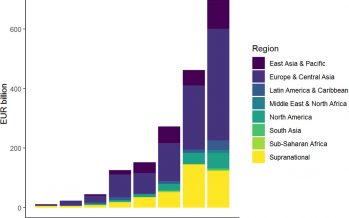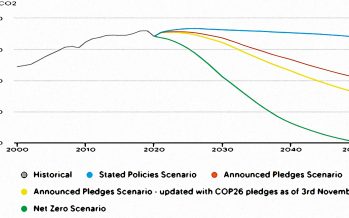Sustainability
Back to homepagePaul Horrocks, OECD: Risk, Return, Impact – SDG Aims Need a Shift of Focus
Russia’s war on Ukraine and interruption of global food supplies has put greater pressure on the development system. Development finance resources will need to increasingly mobilise the private sector. The private sector, meanwhile, is looking for more access to ESG
Read MoreUncertainty is the Only Certainty for BlackRock Founder Larry Fink — but his Outlook is still Positive
Kind-hearted, controversial, keen on going green: the billionaire Larry Fink champions worthy causes without fear or favour By TONY LENNOX It’s no irony that Manhattan-based billionaire Laurence “Larry” Fink is involved in a charity named after the legendary folk hero
Read MoreNicole Hu: Tackling Disaster with Data — and First-hand Experience
California-based One Concern lets tech do the thinking and take the fear out of preparation for disasters and extreme weather events By HEATHER LEAH SMITH Extreme weather events are wreaking global havoc. The US suffered nine billion-dollar weather and climate
Read MoreOECD: Only Scale and Development Impact Will Help Us Reach the SDG Mountain Summit
The development community is used to responding to crises but current events, not least COVID-19, have put the SDGs further out of reach. The private sector is recognised as a key contributor to delivering the SDGs by the development community
Read MoreUNCDF: Growth Capital Plan to Assist the World’s Least-Developed Nations
The International Municipal Investment Fund and allied initiatives will support entities with the potential to make a real difference in frontier markets. The International Municipal Investment Fund (IMIF) UNCDF and Meridiam signed an agreement to collaborate on the International Municipal
Read MoreGreenbacks for a Green Future: It’s the Cost of Decarbonisation
Accelerating the transition toward low- or zero-carbon emissions is necessary to keep global warming at theoretically safe levels. That will probably bring price shocks associated with rising metal prices, energy costs, and carbon taxes — what has been called “greenflation”.
Read MoreMartin Höfeler: Fashions Come and Go, but Style — and Environment — are Forever
It’s all about sustainability in 2022, and there’s likely to be no lessening of focus in coming decades. Sustainability matters, in a way that other modern notions and buzzwords don’t. People matter; the planet matters. In the fashion industry, brands
Read MoreTamsin Lejeune: Saving the World in Style
Tamsin Lejeune, founder and CEO of the Ethical Fashion Forum and Common Objective, is uniting a global community behind a mission to make fashion more sustainable. Lejeune worked as an architect before striking out in the fashion industry. She grew
Read MorePollen Street Capital – All Players are Part of the Solution: Proceed with Purpose to Maximise ESG Impact
Pollen Street Capital is a purpose-led asset manager whose overarching purpose is to deliver long-term sustainable performance through frictionless financial services. That means commitment to actions that generate positive impact for investors, people, portfolio companies and wider society. As stewards
Read MoreFitch Ratings: Enduring Focus on ESG and Sustainability Projects at Leading Credit Ratings Provider
For over a century, Fitch Ratings has been building and creating value for global capital markets around the world. The firm’s rigorous analysis and expertise have led to the development of market-leading tools — methodologies, indices, research and analytical products
Read More






















































































